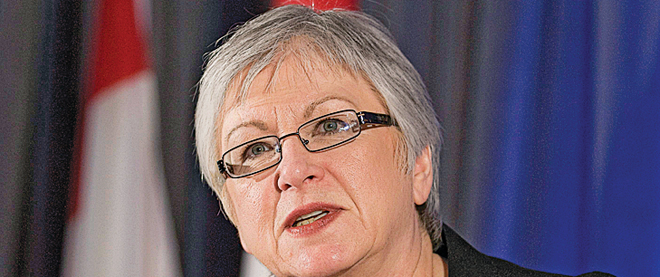The one bureaucrat we’ve all come to trust
Few taxpayers will quibble with Sheila Fraser’s effectiveness
Mohammed Salem/Reuters; Adrian Wyld/CP
Share

Ineffective government programs. Reckless spending by bureaucrats. Taxpayers’ best interests ignored. Sheila Fraser may have retired at the end of May, but the auditor general’s report released last week bore the unmistakable stamp of her efforts over the past 10 years.
As usual, the report covered a wide variety of topics of great interest to taxpayers. Chief among them was the mystery of the $50-million G8 Legacy Fund. Originally approved by Parliament “to reduce border congestion,” it was instead spent on gazebos, docks and flower pots in cabinet minister Tony Clement’s riding. Fraser’s interim replacement John Wiersema described the process as “very unusual and troubling.” (The good news was that the entire bill for the G8/G20 summits was $664 million, substantially below the $1.1 billion originally budgeted.)
The report also reminded Canadians of the embarrassing living conditions on native reserves, despite billions in federal funding; all of which suggests better governance on reserves, and not more tax dollars, is the condition necessary to make a difference. And it found the Department of National Defence has “dropped the ball” in reforming the Canadian Forces reserves’ pensions, and that the government is making “unsatisfactory progress” in managing large information technology projects.
Fraser’s decade in the public eye has been spent uncovering the many such failings (and occasional improvements) in federal government spending. In 2002 she looked into allegations surrounding the three advertising contracts at the heart of the Liberals’ sponsorship scandal and famously accused senior bureaucrats of breaking “just about every rule in the book.” That moment, it can be argued, marked the beginning of the federal Liberals’ current troubles.
Later she took the federal gun registry to task, pointing out that what was supposed to cost taxpayers a mere $2 million ended up totalling $1 billion. And she revealed serious problems in payments to bureaucrats such as privacy commissioner George Radwanski and federal inmate ombudsman Ron Stewart.
While foes accused her of being deliberately confrontational and a publicity hound, few taxpayers will quibble with Fraser’s effectiveness in looking out for their money. Her gimlet eye for government waste and inefficiency earned her a public affection rare among civil servants. A recent poll by Reader’s Digest, for example, listed her third among most-trusted Canadians. And in the CBC’s Greatest Canadian contest, she ranked 66th, ahead of scientist Dr. Charles Banting and singer Anne Murray.
Of course Fraser is not the first auditor general to shine a bright and necessary light on the abuse of federal tax dollars. Kenneth Dye, auditor general from 1981 to 1991, was lauded much as Fraser is today for his outspoken critiques of government spending, in particular Petro-Canada’s spending habits and the relocation of a federal prison to prime minister Brian Mulroney’s riding. Earlier, Andrew Maxwell Henderson (1960 to 1973) uncovered his own horror stories of government mismanagement, such as the HMCS Bonaventure scandal, in which the refit of Canada’s last aircraft carrier came in at triple the original estimate. Adding salt to the wounds, the ship was sold for scrap a few years later.
And yet what has marked Fraser’s term as remarkable is her singular tenacity, recent legislative changes that have given her broader powers, and the ability to transmit her findings to a much wider audience. All of this has elevated the office of auditor general to much greater importance in Ottawa.
In ways that government or opposition parties cannot or will not, the auditor general has become the one institution taxpayers can trust to represent their interests unambiguously: scrutinizing government spending, ferreting out waste and mismanagement and bringing it all to the public eye. Canadians have come to understand instinctively that the auditor general is always on our side. And this should be considered one of the singular achievements of Canadian democracy.
It is now up to Prime Minister Stephen Harper to select a new auditor general. We trust Sheila Fraser’s successor will continue the proud and necessary tradition of acting as the taxpayers’ best friend, loyal servant and tireless champion.